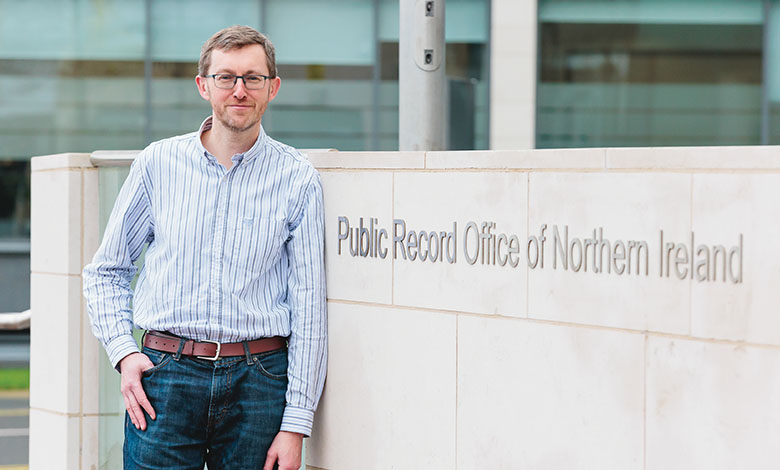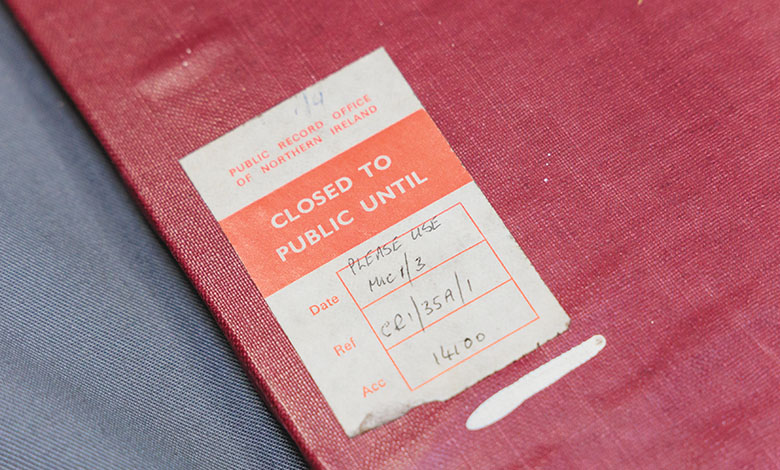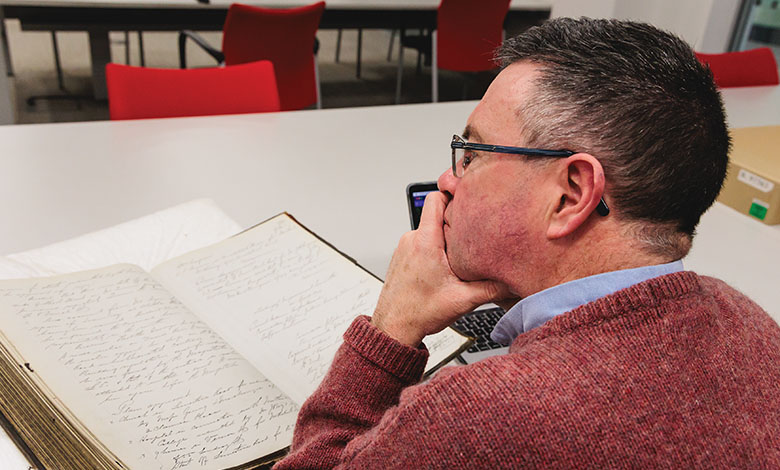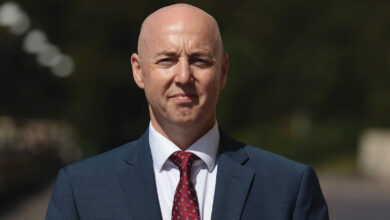Opening up the archives

One hundred years after the formation of an official public record office for Northern Ireland, David Whelan talks to Acting Director of PRONI, David Huddleston, about receiving, preserving, and making available the public record.
Spacious, well-lit, and welcoming, first impressions of the Public Record Office of Northern Ireland (PRONI) are a far cry from what might be expected of a facility trusted with preserving a Papal Bull by Pope Honorius III dating back to 1219, correspondence from Theobald Wolfe Tone from 1798, and notebooks and letters accounting individual experiences of the Battle of the Boyne and the Easter Rising.
Custom built in 2011 to succeed a former Balmoral Avenue site which had grown unsuitable in its size and functionality, the Titanic Boulevard building boasts large exhibition space, an onsite cafe, a large public search room, as well as specific reading rooms, purposely set to entice the public in.
The building’s modern and inviting design cloaks its primary function, to receive, preserve, and make available the public records of government and the wider public sector over the past 100 years.
Describing the layout as “like a medieval castle”, whereby the core of the building acts as its stores, Huddleston explains that the public-facing areas serve as a protective layer for the vast array of documents that lie within.
While the majority of PRONI’s public records date from the partition of Ireland in 1921 to the current day, older documents dating back to the late 18th and 19th centuries are also held. As well as acting as the official place of deposit for public records in Northern Ireland, PRONI also collects a wide range of archives from private sources.

Set up post-partition, PRONI has set about using its centenary to raise awareness of the public accessibility of the historical treasure trove it holds.
Huddleston has spent his whole career (25 years) working in the public record office across a range of divisions including record management to cataloguing and spent the last 14 months as Acting Director.
Quizzed on the fascination PRONI holds for him, he explains: “For some, the idea of a public record can sound mundane, but it is not the case. These records have a unique ability to transport you to a moment in time and give you a personal experience of history.
“One example is a piece that resonates with me a lot, a piece that I catalogued and one that would not instantly jump out as historically significant. They were the diaries of a mid-19th century County Down farmer called James Harshaw, from Donaghmore. Through his account you hear of his family ties to unionism and nationalism, of sickness in the community, and tales of those emigrating. He shares relatable emotions, but I was reading them in the context that this timeframe was the rise of the Young Irelanders and also the blight first appearing on the potato. We had the opportunity to read a first-hand account of the personal experiences of someone who lived through the famine, which I consider a real privilege.”
Official files
PRONI is most popularly known for its work in the annual release of selected official files. Every year since 1976, official records held by PRONI which are 30 years old have been reviewed, with some made publicly available. In September 2011, the time limit for the release changed from 30 years to 20 years and this change is being phased in over 10 years, with two years’ worth of records being reviewed and released each year.
These files often give an interesting insight into official thinking at the time of historical events and make for interesting headlines in the media, but as Huddleston explains, the offering of public records is much broader.
“A lot of the stories recounted often involve what you might call the great and the good, or the various elites and they are very interesting, but I think the real gold lies in the accounts of the labourers, farm workers, school children, and those families that found themselves in workhouses.

“There is a very diverse range of people who are represented in the records, and most people will find a connection or something to resonate with within a particular story.”
PRONI coordinates the annual release on behalf of the Department for Communities and files are put through an extensive scrutiny process for data protection. While the public body transferring the file must assess its suitability to be released, Huddleston highlights that there “is no exemption for embarrassment”, meaning that some of the information lends itself to media headlines.
“Our approach is for openness and transparency. We want as much information as possible to be publicly available and so, where a public body is recommending closures, we will review those files against Freedom of Information Act exemptions and contest any areas where we believe the request is too conservative.”
Centenary
PRONI’s centenary celebrations have centered on raising awareness of the public accessibility of many of the records it holds. Unlike in a museum, where many artifacts are displayed behind protective cases, much of PRONI’s documents are available to touch, feel, and read.
They have hosted a range of activities, exhibitions and events to reconnect with users in a post-Covid-19 era and encourage new users to engage with their content.
In November 2023, PRONI partnered with Libraries NI to launch a programme which saw historical documents specific to the region put on display at a local library. As a result, one example was at Derry Central Library which played host to a letter from Seamus Heaney to fellow renowned poet John Hewitt in September 1966 following the publication of Death of a Naturalist; a highly decorated map depicting the siege of Derry in 1689; and an 1800s passenger book of those leaving Foyle Port for Philadelphia, Québec, and St John, New Brunswick.

Discussing the project, Huddleston says: “It was a great experience to take these unique and original records on the road to local communities where they were first created. Archives are for everyone. They tell us about our people, and our places, so this was a fantastic opportunity to see original historical records up close in a local library.”
PRONI has extensive engagement with neighbouring archives such as The National Archives of Ireland, and the National Archives (UK). It is through these relationships that in April 2023, PRONI was able to play host to the UK Government’s original signed copy of the Belfast (Good Friday) Agreement. On loan from The National Archives, the first public appearance of the document in Northern Ireland coincided with the 25th anniversary of the signing and was hosted as part of an exhibition which also included a record of the first official NIO meeting with Sinn Féin delegation led by Martin McGuinness in December 1994; plans by the then Secretary of State to change the public image of Parliament Buildings at Stormont; notes from meetings with the late John Hume and David Trimble in April 1998; and from discussions with the Orange Order in November 1998.
In April 2023, PRONI was also able to borrow and display one of 26 original remaining copies of the American Declaration of Independence from the National Archives (UK), celebrating the role of Scotch-Irish American people in the declaration.
Recovery
Equally, PRONI, alongside Trinity College Dublin, was central to the recovery of centuries of lost Irish history as part of a digital project to recover records lost during the 1922 fire which destroyed the Public Record Office in Dublin.
Part of the Civil War destruction, the office lost countless records, some dating back to the famine era and the Beyond 2022: Ireland’s Virtual Record Treasury project sought to make a 3D digital reconstruction of the original building and digitally refill its shelves in time to mark the 100th anniversary of the blaze.
Prior to partition, the Public Record Office in Dublin was an island-wide archive and so pre-1901 census records destroyed during the fire meant a rich genealogical source had been destroyed. As part of its centenary, PRONI established a partnership with high-profile genealogy online platform Ancestry, allowing for approximately 3.2 million name indexes, relating to valuation records for the period 1864 to 1933, being free to access online.
The indexes represent a major enhancement to existing digitised records that have been available on the PRONI website, but which were previously only searchable by geographic location.

Huddleston explains that as well as opening up their archives to a wider audience, the relationships between archives also allow for good working relationships, such as establishing best practices in preserving and cataloguing.
To this end, he believes that the digitisation of records will go some way to assisting with a challenge currently felt by the like of museums around repatriation.
Digitisation presents both opportunities and challenges for PRONI. Around 100 civil servants work at PRONI across a variety of jobs, including conservation staff. The Acting Director explains that a fine line exists between preserving documents, and ensuring the public has access to these important pieces of history.
Interestingly, Huddleston explains, that older documents, often written on expensive paper have proven more resilient and easier to maintain than those on more modern paper. To this end, offering digital access to these documents can help slow any deterioration.
On 31 March 2015, PRONI launched its Digital Preservation System. The primary aim of this system is to store, preserve, and provide access where possible to digital records. The records that PRONI receive are created by government departments, public sector bodies, and private depositors.

Explaining its necessity, Huddleston says: “The emergence of email, and then widespread use across the public sector posed a challenge in that our traditional records were now being ‘born digital’. As the official archive, we have a duty to take the records that are created, and the content quality of those records is really for historians, journalists, and commentators to judge.
On the additional volume, Huddleston says: “The tsunami of digital records is a problem but not one we are grappling with alone. National archives across the globe are also working through challenges, which is allowing us to learn from and share our learnings. Our job is to take those records, store them, and present them in the best way possible and that is work ongoing as we develop our digital retention and disposal tools.”
Only between 5 and 10 per cent of an organisation’s records are transferred to archives. The Acting Director explains that a set criterion is established to try and ensure that perspective is applied to documents to judge how relevant they might be in the years ahead but accepts that no process is “infallible”.
On archiving in a divided society, Huddleston says: “From an archival perspective, we are not trying to interpret the record, we are presenting it and making it available, and it is then for members of the public to make their own judgement. Different documents will present the accounts of different communities, in history and more recently, and some of them may prove contentious, but we aim to be a shared space that provides a lens to history.

“One of the most interesting things to see in PRONI is when you meet someone who has a conception of their community roots, but when they dig a bit deeper, discover the complexity of family history in our society.”
Future
Turning to the future, Huddleston believes that as well as promoting the public accessibility of over 100 years of public record history, PRONI has a role to ensure that those accessing records in the next century have an accurate reflection of today.
On PRONI’s ambitions for the years ahead, he concludes: “I think a major challenge will be addressing the archiving of digital records, to ensure that records being made in the 21st century are preserved and made available.
“It is also about breaking down the barriers and misconceptions about archives and ensuring they are opened up to as wide an audience as possible, both onsite and online.
“Most importantly, we want to fulfil our core function as a national cultural institution, working with our partners across the public and private sectors to ensure that we are receiving, preserving and making available the written and photographic memory of Northern Ireland.”





